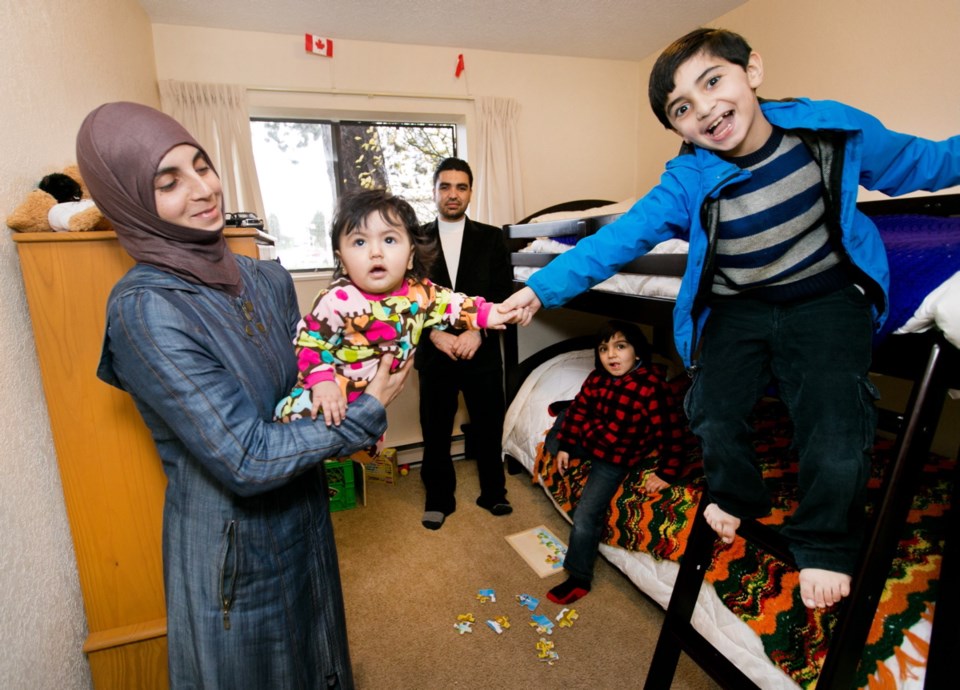The Syrian refugees didn’t even know they were heading to Victoria until they boarded the plane in Jordan.
Flew to Toronto, where the Governor General hugged them on camera, then to chilly Calgary, where there was no one to help them at all.
By the time the five of them — dad Osama, mom Hanadi, their eight- and five-year-old boys and eight-month-old-daughter — finally stumbled off the connecting flight to Victoria on Saturday night, they were exhausted.
But there to greet them were 10 sets of open arms — five local couples, complete strangers to the Syrians.
Welcome to Canada. Welcome to Victoria. Welcome home.
The Syrian refugees — the threat of reprisal against relatives makes it unwise to use their last name — aren’t the first to end up in Victoria, but they are the first to arrive as part of the federal government plan to bring 25,000 Syrians to Canada by the end of February.
Wednesday afternoon found them in their new apartment. The boys, all smiles, were pin-balling between their new bunk beds and the cartoons on the television.
Hanadi, 25, was talking earnestly about this being what she wanted for her children: peace, a promise of a good education, an existence free of the mental strain of refugee life.
Osama, 32, had the relieved look of a man who, after a long and arduous journey, had found himself at the end of a rainbow.
“I was not expecting such a positive reception,” he said through an Arabic-speaking interpreter.
After the last four years, who can blame them?
The Syrians come from Harasta, a district northeast of Damascus where opposition to the Assad regime has been rewarded with indiscriminate bombing. The family’s house was struck by stray gunfire. One of the boys’ beds was hit.
Osama wasn’t really part of the opposition, but that didn’t stop him from being arrested at a checkpoint one day while driving home from Damascus. It was the first of three stints in jail — for two months, two months, then 20 days — that included beatings and torture on each occasion.
The fourth time the government forces tried to arrest Osama, he bolted from his car. Took a bullet in the leg — he has a nasty scar — but escaped. Friends got him to hospital, where he was admitted under a fake name.
A couple of years ago the family fled to Lebanon, first to a cold, disease-ridden refugee camp, then to a rented home. It wasn’t easy. Banned from taking a job, car mechanic Osama worked under the table 16 hours a day. As refugees, the Syrians were treated with disdain by their neighbours. Merchants would regularly overcharge, doubling the price for water.
They eventually got on the list to come to Canada, though where exactly was unknown until they flew out of Amman, Jordan, last week.
Victoria was the destination because of those five local couples, including Michael and Shelley Wuitchik. He was a psychologist, is now a published novelist. She was a teacher, is now an artist. They joined forces with the four other couples in September, soon after the world was shaken out of its slumber by images of drowned three-year-old refugee Alan Kurdi. “The catalyst for us was seeing the pictures of the little boy on the beach,” Michael said.
Some of the arrivals are government sponsored, some privately sponsored and some come through a stream in which the cost of their care is split. In this case, Ottawa is paying $9,000 and the five couples about $36,000 to keep the new arrivals afloat during their first year in Canada. They’re also busy ferrying the immigrants around town, showing them the ropes — the transit system, banks, grocery stores (the iTranslate phone app has been a wonderful discovery). The boys are registered to begin school in January.
The five couples make up what is known as a constituency group — an aggregation of good-hearted people who take on responsibility for specific refugees, working in concert with an established agency, in this case the Greater Victoria Inter-Cultural Association. The ICA is working with about 25 such groups. About 40 others are going through Vancouver Island’s Anglican diocese.
Figuring out who else will come and when has been frustrating, the communication barrier with immigration authorities occasionally impermeable, though understandable. “They’re skilled people who are doing the best they can, but they’re overwhelmed,” said the Anglicans’ Rev. Bruce Bryant-Scott. Ottawa is pulling in retired civil servants, flying them to places like Amman and Ankara to help out.
That makes Osama, Hanadi and family among the lucky ones. Wednesday, Hanadi was still marvelling at the fully stocked fridge that greeted her — though she says so many well-wishers have wanted to feed the Syrians that she hasn’t had a chance to cook. Christmas dinner, roast leg of lamb, will be at the Wuitchiks’ home. (Shelley likes the juxtaposition of the Syrians’ tale with that of the Middle Eastern family given shelter in a manger.)
Hanadi and Osama are grateful. They talk about wanting to become independent, self-supporting, a part of the community. They want to give back.
The Wuitchiks say they’re already receiving plenty. “We’re getting more out of this than they are,” Michael said. “I think for the rest of our lives, we’ll never forget that night at the airport.”
For this isn’t just about the Syrians, but about the rest of us, he said. It’s about the reflection Canadians want to see when they look in the mirror.
“It’s about the kind of country we want to live in.”



